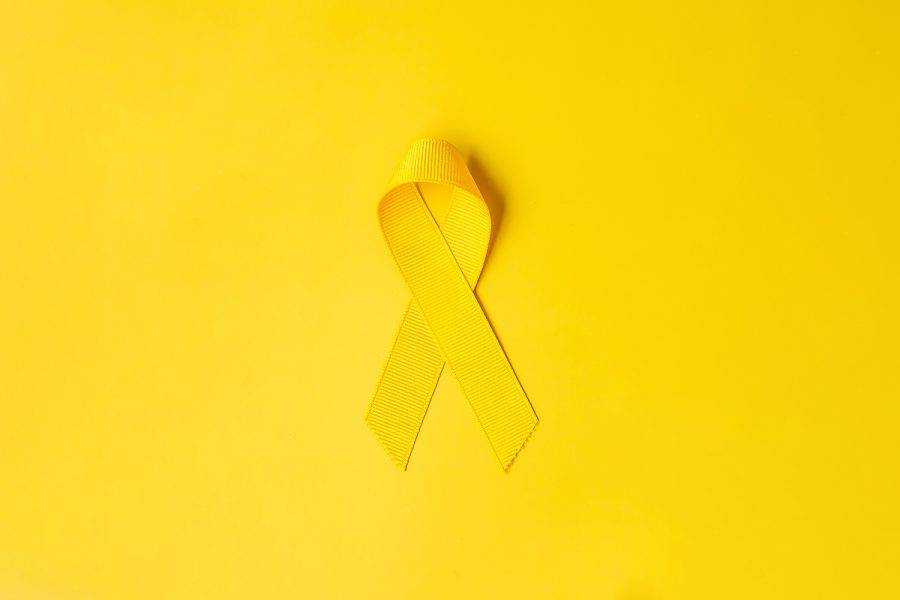Opinion | Advocacy work and awareness are key in children’s health
Advocacy work is key in bettering pediatric cancer outcomes.
Yellow Ribbon on yellow background for supporting people living and illness. September Suicide prevention day, Childhood Cancer Awareness month and World cancer day concept
September 6, 2021
While fundraising initiatives are essential, advocacy work is key in bettering children’s health outcomes. With September being childhood cancer awareness month, we should be looking at ways we can advocate for accessible health care and awareness in childhood pediatric cancer.
Although pediatric cancer treatment is always developing and changing as research is being done, childhood cancer rates have been rising slightly over the last ten years. With that, cancer is the second leading cause of death in children up to the age of fourteen.
In advocating for pediatric cancer, we cannot ignore and should address disparities that exist within the health care system. We should be asking questions about where these disparities come from and what steps can we take to confront them.
Even though pediatric cancer continues to alter the lives of many children and families, only 4 percent of federal cancer research funding is allocated to pediatric cancer. This makes advocacy work crucial in the fight against pediatric cancer.
The end goal should be universal health care. However, families struggling to pay for their child’s treatment need small steps to take place.
While pediatric cancer has reached an 83 percent survival rate, we have a long way to go when it comes to accessible health care. Children coming from low-income households make up 43 percent of pediatric cancer diagnoses, meaning they will face significant financial stress.
Maximum out-of-pocket limits are essential for families going through pediatric cancer treatment. These limits prevent families from spending a certain amount on medications and procedures through treatment. Each year, this limit changes. For 2021 it’s $8,550 for individual insurance plans and $17,100 for family plans.
Most families will reach this limit within the first three months of treatment. This protection is essential for these families, but many still struggle affording costs up to these limits. These maximum out-of-pocket spending limits need to be lowered and adjusted to meet family’s needs.
But financial stress is not the only barrier families dealing with pediatric cancer face.
Race and socioeconomic status have an effect on cancer treatment and outcomes. Non-Hispanic white children are most likely to be diagnosed with cancer. However, the number of children who die of cancer is similar across these three groups. This indicates Black and non-white Hispanic children diagnosed with cancer are less likely to survive.
Along with findings showing that race affects the statistical outcomes of pediatric cancer, the Centers for Disease Control and Prevention has evidence suggesting location plays a role. There are several things that could influence rates of cancer varying by geographic location. For example, increased exposure to carcinogens with air pollution and genetic variation in some populations.
On top of families bearing the weight of cancer treatment, COVID-19 is another worry. Children now account for almost 25 percent of COVID-19 hospitalizations in Iowa. Children with cancer have a 20 percent chance of having severe symptoms with COVID-19, while other kids have a 1 to 6 percent chance of severe infection.
It is especially important to do this advocacy work now as this vulnerable population is facing the pandemic and rising threats with COVID-19.
These issues go beyond accessibility to health care and funding for research; however, these are still things we need to be advocating for. One thing that is essential in effective treatment is early diagnosis. Findings show that higher income countries with accessible health care generally have a pediatric cancer survival rate that is over eighty percent.
All children and families facing pediatric cancer deserve access to safe and affordable health care. Getting a diagnosis as early as possible and having the means to advocate for the best care possible are crucial. Advocacy work is a huge part of how the doors to better care can be opened.
Columns reflect the opinions of the authors and are not necessarily those of the Editorial Board, The Daily Iowan, or other organizations in which the author may be involved.




